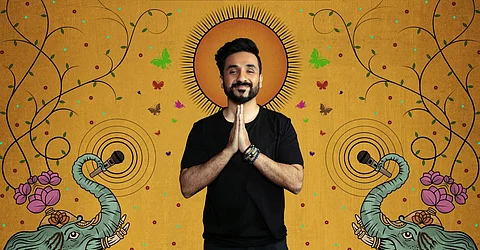

The title of Vir Das’ Netflix stand-up special, For India, found profound meaning after it received a nomination at the International Emmys. After all, the comic calls it a “love letter to Indian culture,” and adds that he aimed to take the culture out to the world with the special. With the show being nominated alongside other international titles such as the popular French series, Call My Agent!, the Colombian show, Promesas de Campaña, and the British title, Motherland: Christmas Special, Vir is convinced that his idea has seen fruition. “It’s nice to feel seen as an artist and have your work recognised, especially when it’s about India. With this show, I intended to say, ‘I believe my people and culture are funny’. It’s a great feeling to have that thought validated.”
The news of the nomination, Vir says, came as a shock. “Somebody sent me a message on WhatsApp, and I thought it was nonsense. Even when I saw a couple of tweets, I didn’t think it was true. It was only after Netflix got in touch that I started to believe,” he says, laughing. “What makes it more special is getting nominated alongside international series and being the first Indian comic to do so; that was more surprising to me than anything else. I never thought stand-up comedy could make it to the category.”
Vir, one of the most popular names in the Indian stand-up comedy scene, is both a first-hand witness and catalyst to the evolution of the medium in the nation. What has changed? “Everything,” Vir asserts. “There has never been a better time to be a stand-up comedian in the world. There are more venues, platforms, and tickets being sold. The artform too has evolved. More risks are being taken and more people are listening to our voice.”
The comic also believes that the reach of stand-up comedy is way beyond the urban regions. Vir’s take on comedy reaching interior parts of heartland India is identical to something Raju Srivastav once said about Johnny Lever. Speaking of the fame Johnny Lever’s audio cassettes enjoyed in the ‘90s, Raju said, “His voice and work reached places where even he couldn’t visit in person.” Vir too, says something similar, albeit for the modern viewers. “India is one of the largest markets for smartphones and YouTube. Hindi stand-up comedy has a far wider reach than English stand-up comedy in India. Stand-up comedy is more of a smaller city artform than a larger city artform.”
A few political satirists have also used the art form as a medium of dissent, but Vir rejects the idea of comics being the voice of dissent. “Comedians are not the voice of dissent, journalists are,” he says. The comic, however, admits that more ‘realness’ is expected from them. “The humour has come way past ‘husband and wife’ jokes and our work is now expected to talk about real issues and tell a story from a unique perspective. There has never been more depth expected out of comedians. Comedians are now storytellers.”